Polly is a spunky circus lass who falls off her horse and into the waiting arms of the local minister. Tongues wag, of course, but can this mismatched couple find true happiness? A heaping helping of nostalgia with Mae Marsh’s winsome orphan routine thrown in.
I will also be reviewing the 1932 remake starring Marion Davies and Clark Gable. Click here to skip to the talkie.
No girls allowed!
Conventional wisdom says that of all D.W. Griffith’s leading ladies, Mae Marsh’s career did the poorest away from his guidance. Lillian Gish made some bona fide solo masterpieces, Dorothy Gish charmed in her own series of comedies, Miriam Cooper and Blanche Sweet both found success with their new director/husbands (Raoul Walsh and Marshall Neilan, respectively). And Marsh? What did she do on her own? Did she create nothing of artistic value before reuniting with Griffith to make The White Rose in 1923 or was her solo work stronger than we have been led to believe?
Looks like we’re going to find out because I have her 1917 vehicle, Polly of the Circus, all ready to go. Let’s see if it stands up to scrutiny.
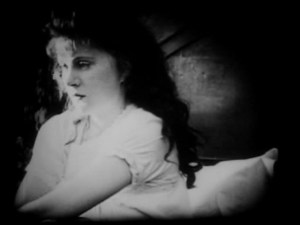
The circus has come to town and local boys Jim and John (played by siblings Stephen and John Carr) rush to the festivities. Jim has no family and has been living a Huckleberry Finn existence while John is the minister’s son and destined to follow his father’s profession. The event proves to be fateful for both boys as they meet a newly-orphaned girl named Polly (Mildred Call), the “youngest rider in the world”. Her mother (Lillian Ward) has just been killed in a high-wire accident, leaving her daughter in the care of Toby (Harry La Pearl), a big-hearted clown who had loved the mother and vows to care for the girl as his own.
Jim falls for the lure of the circus and, as there is nothing for him in town, he decides to join them. John waves as his best friend rides away among the clowns, horses and little Polly.

Many years pass and we see that John (Vernon Steele, best known as King James in Captain Blood) has indeed grown up to be the town minister. He has two servants played by actors in blackface whom we will not talk about except to say that their corny humor and racist dialect title cards are a festering pustule on the backside of this film.
Polly (Mae Marsh) has grown up as well and is now the world’s greatest equestrienne, which I did not know was a word. She has two father figures: old Toby is still there and Jim, who has grown up to be the “boss canvas man” of the circus, that is, the guy who makes other guys put up the tents. He is now played by Wellington Playter, who stalked Nell Shipman all over Back to God’s Country and was nearly killed by Lon Chaney in The Wicked Darling.
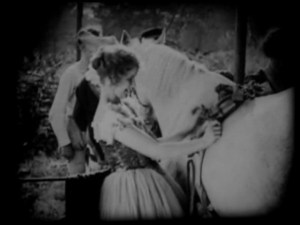
Polly and her prize horse Bingo are planning to perform a dangerous stunt involving hoops. It doesn’t seem proper to try the new tricks at their next gig as it is the town where her mother died but Polly will not be dissuaded. Meanwhile, the more religiously conservative elements in town gather ‘round the organ and sing hymns about how the performers and circusgoers are on a highway to hell.
The inevitable happens. Polly gets konked on the bean and needs to be rushed to the hospital but wouldntchaknowit? The hospital burned down and so she is carried to John’s house. John’s housekeeper may be a racist caricature but she is a woman so the whole thing is quite respectable. At first.
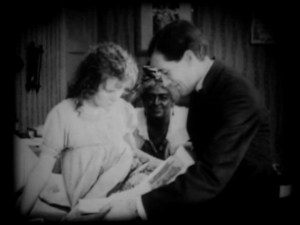
The circus has to move on before Polly recovers and so she has time to get to know her benefactor. At first, she thinks John is one of those stiff, sanctimonious fellows but his gentle and sincere manner soon wins her over. He’s out to show kindness, not make himself feel superior.
However, there are others in town who are more than willing to take up the hypocritical mantle. Deacon Strong (Charles Riegel) has two hobbies: buying up racehorses and forcing his own stiff beliefs on everyone else. Also, his daughter is rather hot to trot on the idea of being Mrs. John, so there’s that. Strong and the hellfire singers decide that Polly needs to leave the minister’s house or he has to leave the church. John, however, refuses to budge. Polly has done nothing wrong, she has been attending church regularly and she has as much right to be in his house as any recovering patient.
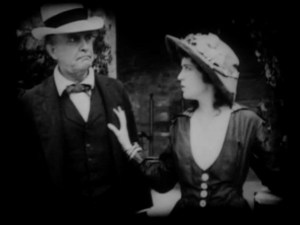
Meanwhile, Toby and Jim manage to buy Polly’s horse, Bingo, from the ringmaster and send him to her. He won’t perform for anyone else and Polly is overjoyed to have him back. Around the same time, we discover that Toby is too old to work as a clown anymore but he needs money to live on. Polly hears about a local horserace with a generous cash prize. If she can ride Bingo and win that money, Toby will be set for retirement!
Of course, to win that money she will have to beat Deacon Strong’s horse. And she will have to ride Bingo. In pants. Gasp! Such scandal! This is 1917, after all. Will Polly don trousers to win the day? Will John figure out how to be religious without bowing to the obnoxious? Will Toby the clown be able to retire? Find out in Polly of the Circus!
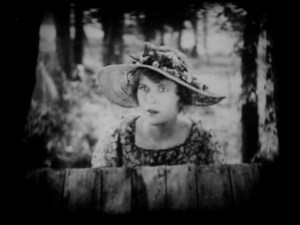
Okay, the first question everyone will be asking is how Mae Marsh works out as Polly. Pretty darn well. Marsh does great vulnerable and she is fantastic as a waif. Polly of the Circus plays to her strengths, giving her plenty of moments of tearful reflection, as well as some nice bits of spunk to keep things from getting too maudlin. In general, she gives an appealing performance as a likable character. Can’t ask for anything more, can we?
Vernon Steele also does good work as the kind-hearted and progressive minister who finds himself preaching to a town that wants hellfire and brimstone. He comes off as boyish and idealistic, perfect for the role. Wellington Playter is also cast well as the rough but kindly Jim.

As Toby the clown, Harry La Pearl does overdo the whole tears-under-the-makeup routine. I mean, I grant you that any time we are shown a major character in clown makeup, they are going to have to cry at some point but I think this picture overdoes it a bit.
But, in general, the performances are quite solid. What about the rest of the picture? What is the overall tone?
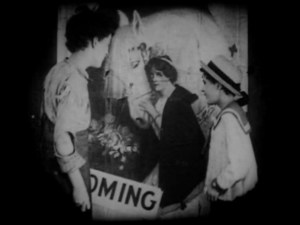
By 1917 it was clear that the raging war in Europe would not end as quickly as anyone had hoped it would. While American wartime cinema has a deserved reputation for going pedal-to-the-metal with violent propaganda (it really reached a fever pitch in 1918) American moviegoers also wanted to wrap themselves in a warm blanket of nostalgia; the popularity of Charles Ray’s corn-fed pictures proves this. Polly of the Circus also plays to this desire by layering the Americana high and deep.
The result is a film that has aged far better than the nasty propaganda pictures of 1918. Watching Polly of the Circus is like drinking a big mug of cocoa with marshmallows; this is cinematic comfort food. The film frankly appeals to nostalgia with its “remember when…” title cards but what about modern audiences? After all, Polly of the Circus is recalling the halcyon days of the 1890s-1900s, something most adults in 1917 would remember vividly. Well, Polly is smart about its nostalgia and keeps things just vague enough to make it universal. We may not be exactly the target audience but we get the point.
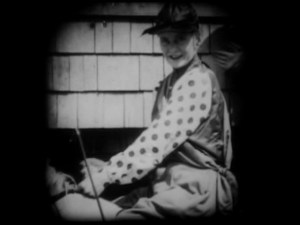
Polly of the Circus also maintains a balance. A bit of pathos, a touch of romance, a dab of tragedy and a fiery kick of action… Nothing stands out enormously but it is structured well and is a solid drama with some intelligent questions at its center.
Mae Marsh’s post-Griffith career may not have gone as well as she may have wanted but it was not without highlights. Her fans should enjoy this picture as it plays to all her strengths but even non-fans should find plenty to love. This film was a very pleasant and welcome surprise.
Movies Silently’s Score: ★★★
Where can I see it?
Polly of the Circus has been released on DVD by Grapevine. I would avoid the Alpha release as they tend to cut out scenes and intertitles.
Polly was so nice they filmed her twice! Fifteen years after Mae Marsh scandalized the locals with her romance with a minister, Marion Davies gave the story a whirl with Clark Gable as her leading man.
Davies was one of the most talented comedians of the silent era and she kept right on working in the talkies. Polly of the Circus was a modest hit for her, making a profit of $20,000. However, this may have been due to the fact that it was released at the same time as MGM’s other big top film, a little picture called Freaks. Polly was reportedly substituted for Tod Browning’s freak show picture in more than one venue.
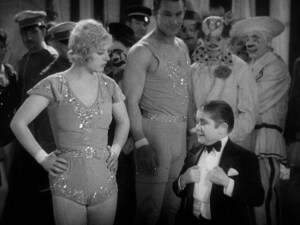
A lot had changed in the fifteen years since Mae Marsh had played Polly. The world had gone from the Great War to the Great Depression, sound had taken over Hollywood and movies had taken on a hard-boiled attitude. Could a play from 1907 succeed in this landscape? We shall see.
Polly of the Circus (1932)
This time around, our Polly (Marion Davies) ain’t no waif. She’s a smokin’ hot trapeze artist whose posters drive the censors insane. A trapeze artist in a body stocking? Oh, I shall surely faint! When she sees that some jerk has pasted underpants to her more, um, detailed posters, she is hopping mad. In she marches to give the preacher, Rev. John Hartley (Clark Gable), a piece of her mind. He turns out to be innocent of despoiling her posters, which leaves me to wonder why she was so sure it was him. Is this the only church in town? Surely not as it seems to be a rather large community. Does she have something against Episcopalians? Inquiring minds wish to know!
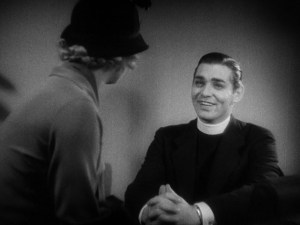
Anyway, Polly is about to attempt a dangerous new stunt with the help of some rather unconvincing rear projection and excellent stunt doubles. (Davies and the other aerialists were doubled by the Flying Codonas, who had performed the aerial stunts in A.E. Dupont’s Variety and F.W. Murnau’s The Four Devils. Their story is full of triumph and tragedy: romance, fatal accidents, murder, suicide. No screenwriter would have dared invent them.)
At exactly the wrong moment, someone shouts a wisecrack about Polly’s pants and she falls to the ground. Did I mention that she works without a net? It seems that she has contracted the very dangerous Movie Injury, which renders its victim unconscious but irresistibly attractive. Hartley suggests that they take Polly to his house for Entirely Honorable Reasons, He Promises.
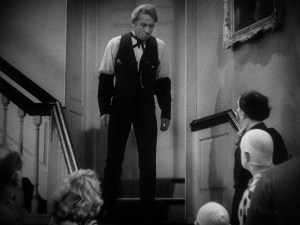
John’s servant is Downey (Raymond Hatton), a weird little religious fanatic who drinks like a fish and grumbles about how horrible women are. You commit one little rape and they send you to prison, sheesh! (Lovely character, MGM, really first class.) He thinks Polly means to entrap his boss with her wiles, as unconscious women are wont to do. Oh and he’s violent. At this point one begins to wonder at John’s basic decision making.

Anyway, the circus moves on but we get more banter between Polly and the reverend. Oh goody. He buys her some glossy magazines but then tells her that there are hotter stories in the Good Book. Polly picks up the bible and starts reading for the “hot” love stories but from the place she opened, it looks like she is in Deuteronomy. “Thou shalt not muzzle the ox when he treadeth out the grain.” Phew! Sizzling!
In any case, the inevitable happens and our bickering duo starts to fall for one another. Polly discovers that religion is totally awesome and Hartley… doesn’t really have to do anything because it is a Man’s World. Unfortunately, Downey is all paranoid and weird and possessed of an incredibly dirty mind and starts shouting random accusations at Polly and Hartley during a church service. (Keep an eye out for a very young Ray Milland as a church usher in this scene.) And then something, something, blah, blah, blah, they get married and Hartley is forced out of the church by none other than his uncle, C. Aubrey Smith. And then things get incredibly depressing because Hartley won’t let Polly work but he can’t be a preacher while he’s married to her but divorce won’t do any good either. But what if he’s… widowed.
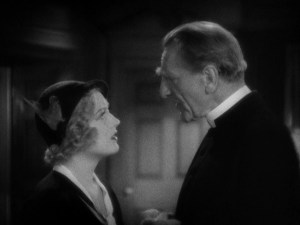
I would say more but that would be telling. You can probably predict the outcome anyway.
Alas, Davies is underused in this dreary picture. What starts out as a so-so romantic comedy quickly turns into a soaper and those are never the roles that bring out the best in her. It’s not that she’s bad, it’s just that there’s nothing for her to do in the goofball line.

I must confess that I am not a huge fan of Clark Gable (my 30s and 40s heart belongs to the fellas over at the Warner Brothers lot) and this film did little to change my mind. He is simply miscast and the film tries to compensate by adding an, ahem, enthusiastic boxing/wrestling scene. He’s a two-fisted minister, darn it! Never mind that this never, ever figures into the plot.
Instead of the gentle romance that the 1917 version cooked up, we get a tough-talking banter match between the romantic leads. If this sounds like fun, let me assure you that it is not. You see, this is one of those films where the male lead is given all the best comebacks and the female lead is portrayed as emotional and even hysterical. The basic smug attitude is that she needs to be put in her place. It’s all very tedious because it’s not a fair fight. (No one can win a fight against the screenwriter’s pet character. It’s like an actress at MGM trying to get a part that Norma Shearer wants.) Plus, the dialogue is pretty poor, with characters reduced to punning about vests and vestries. At one point, Gable actually says to Davies (I swear I am not making this up) “See the pretty pictures?” Ugh.

Also, the basic structure of the story is shifted about. By having Polly and Hartley meet and banter early on (with him giving her a goony leer the whole time) and then having him be the one to suggest that she be taken to his house, the movie turns the most important plot element into something a bit opportunistic and creepy. “Yes, bring the hot, feisty babe to my house to recover!”
Likely due to religious pressure, the church figures of the film are portrayed as sugar and cream and sweetness and rainbows. Sure, they doubt Polly at first but not due to any real flaw in their characters; they just want what’s best for John. By turning them into living saints, the 1932 film strips away layers of complexity that come with a variety of religious characters, devout and hypocritical. The role of antagonist is taken over by Raymond Hatton’s character, an alcoholic with a past conviction for sexual assault and a walking cartoon to boot. Oh dear.
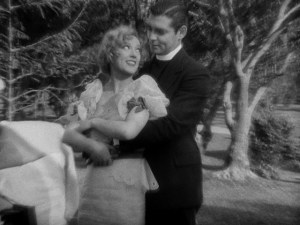
Without the hypocrites to balance things out, the story of Polly’s conversion comes off as overbearing and unrealistic. Further, by ripping away the original story’s main character arcs (the male lead realizing that his religious calling does not need to include bowing to fundamentalists as the female lead realizes that religion need not be intolerant) the 1932 version deals itself a fatal blow. The finale with Polly contemplating suicide is meant to replace this but it comes off as abrupt and unbelievable, especially with John’s uncle suddenly going from Polly’s biggest detractor to her most ardent fan in 2.3 seconds.
And the winner is…
The Silent
The 1917 version is simply a stronger story with deeper, more complex characters and something interesting to say about the characters and their religious beliefs. Further, it balances religion, romance and spectacle so that one element does not overwhelm the others. The 1932 version feels timid, like the screenwriters were afraid to touch the bigger questions of the original source material.

Marion Davies is not allowed to caper and josh even though her natural wit has always been her biggest asset on the screen. Clark Gable is a thoroughly unconvincing minister; he looks more like a meter reader going to a costume party.
Perhaps the story simply was too old-fashioned to survive the dark days of the Depression. Whatever the reason, the 1932 film takes everything that was charming or interesting about the original and chucks it away.

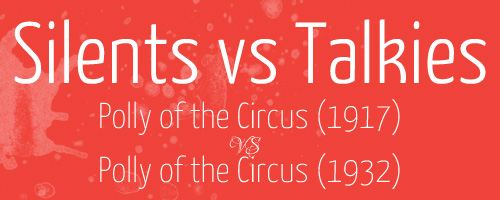
I really do wish Marion Davies had better material in the advent of sound, but at least the Mae Marsh version is good. Do you think she did better or about the same out of Griffith’s shadow? I always figured Gish did better once she was working with directors like Sjostrom and Vidor. Is that the case with Marsh, you think?
Well, I would like to see more of her stuff from this 1917-1920 period but I did note a definite decline in the annoying hippity-skippity stuff Griffith loved so much. I think perhaps her sad waif routine just didn’t work with the 1920s, “The White Rose” was not really a hit even though it was the best thing Griffith had done in years.
Sounds like the 1932 version butchered the source material to the point of being unrecognizable. Why would they bother doing a remake if they made so many changes, or else why not give it another name? Anyhow, great review as always!
Thank you! Yeah, they completely missed the point of the story, which is strange because it wasn’t particularly subtle.
Have to disagree with you about Gable. He was a god! (Although he should never have been a minister.) And he really didn’t come into his own until Red Dust, a year after Polly. I’ve seen the talkie version, with no background about the play or the silent, thought it was just weird and wondered how anyone thought it was a good idea. Now I can see what happened. “Hey, we have the rights to this story, let’s re-use it. But we have to change this and this and that, and we’ve got that Gable guy under contract, so let’s give him the minister role…” Although I have not seen the silent, I have no trouble believing it was better.
Yeah, Gable never really did it for me in any role, give me the Warner gangsters any day of the week! However, this film was definitely not his fault as the story is so ridiculous. I mean, we’re supposed to believe that all the high mucky-mucks of the church are perfectly okay with Raymond Hatton’s violent pervert working in the church but Hartley marrying Polly fair and square is somehow wrong because she used to be an acrobat? Ummmmm… If nothing else, having a trapeze artist as the minister’s wife would make church functions a lot more fun. 😉
You are such a funny writer and had me in stitches a few times. I just can’t even think of Gable in a priest’s/Minister’s outfit-hahahaaa. I don’t mind him but give me Jimmy Stewart:) The picture of Marion Davies waking up with everything perfect on her…I wake up every morning like this…ok in my dreams but still. Actually it looks like, if she got up from her pillow, her hair would stay there. It looks like a wig. I always liked Mae Marsh, there is something about her that I find I just can’t take my eyes off of her
Thank you! Yeah, this movie has so many problems on every level, from the screenwriting to the casting to the costuming. Poor Marion deserved better.